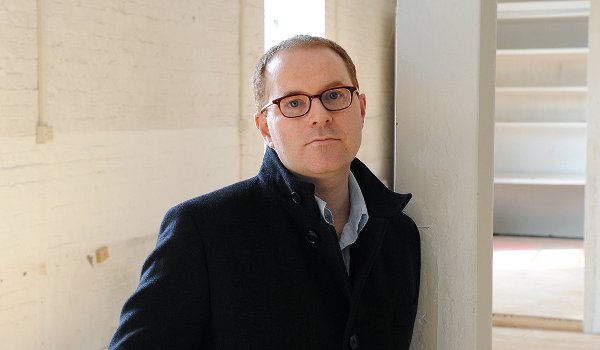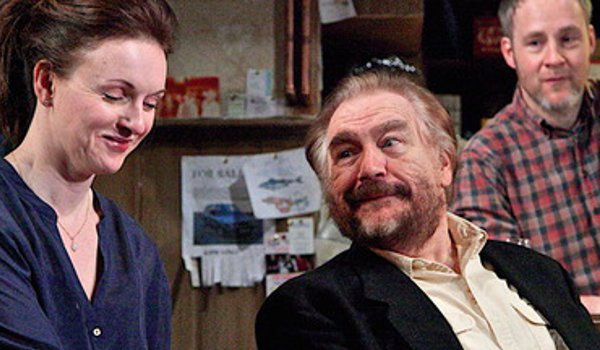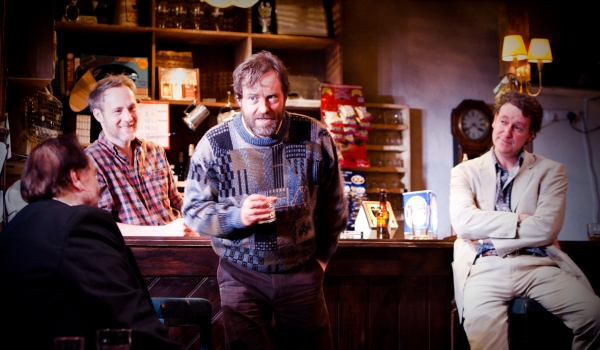This article first appeared in the Irish Post print edition of June 8.
CONOR McPHERSON was 29 when his pancreas ruptured.
It was February 2001 and the Dubliner, acclaimed by many as the greatest living playwright of his generation, was on his way to the West End premiere of his seventh play, Port Authority, when he received a crippling pain in his stomach.
A sustained, four-year period of drinking had caught up with him. His pancreas had become inflamed to the point of nearly proving fatal.
McPherson spent the subsequent nine weeks in hospital. For the first three he was unconscious.
“They said,” he later recalled, “if you drink again, you die.” Twelve years later and a now sober McPherson is back in London.
The Night Alive, his twelfth theatrical work, will be performed on-stage for the first time next week.
 Conor McPherson
Conor McPhersonAlthough nobody has yet seen it, its seven-week run is long since sold out and follows a just completed — and hugely successful — revival of his most revered work, The Weir.
It’s during rehearsals for that supernatural-influenced play that we meet on an overcast April afternoon in central London.
McPherson, now 41, is not long off a flight from Dublin. The Covent Garden rehearsal room where he’s busily at work is in keeping with how one would picture such a working environment, all large, open-planned spaces bordered by gleaming white walls and huge windows.
Sat within a glass-panelled office off to one side, as if on exhibit, is McPherson.
Dressed in a light blue shirt, unfussy jeans, and black, working man’s boots, he cuts something of a spooky figure, his ghostly pale complexion off-set by his bright, tightly-cropped ginger hair.
Next door, the cast of The Weir, actors Ardal O’Hanlon, Brian Cox, Dervla Kirwan, Risteárd Cooper and Peter McDonald, are taking lunch.
McPherson has spent the morning with them.
He’s been looking in on their rehearsals, answering questions and generally offering his seal of approval to a production he otherwise has little involvement in outside of the marvel of words he committed to page 16 years ago.
 Instead his focus remains very much on the June 13 premiere of The Night Alive, which, like all first productions of his work, he will also direct before essentially washing his hands of the play and moving on to the next thing.
Instead his focus remains very much on the June 13 premiere of The Night Alive, which, like all first productions of his work, he will also direct before essentially washing his hands of the play and moving on to the next thing.
“For me,” he says, “the first production of a play is really an extension — or even a continuation — of the writing of the play because only when you see it coming to life can you really understand what it is.
“When you reach the end of that journey, sometimes your feeling is that there’s not a lot for me to discover. You’re also slightly disappointed, because you’ve seen it.
"When you’ve had an idea for something, and it’s a vague idea, of course the play is perfect. It hasn’t been tried; you’ve never seen it; nobody has seen it… and it’s perfect.
"When you get into it and you’re directing it, sometimes what you are trying to do is to solve all its problems. In a way you’ve wrecked your dream by making it real, which is not to say that it’s bad, but just that that particular process is at an end.”
In conversation, McPherson is a quietly intense interviewee with perfect conversational manners.
Each question is taken in respectfully and attentively. There’s no fidgeting, gazing to the floor or signs of distraction.
Only in the seconds between question and answer will he sip his tea before responding in his soft-spoken, direct and honest manner, all the time his blue eyes fixed intently upon you.
Born the son of an accountant and a housewife in north Dublin in August 1971, he began writing plays in the early 1990s as a student in University College Dublin.
A philosophy graduate, he was heavily involved in the university’s drama society, DramSoc, and went on to set up the Fly By Night Theatre company in 1992, while still in college, with some fellow students, including actor Peter McDonald.
 His first notable work, the monologue Rum & Vodka, was staged in 1994 but it was 1995’s This Lime Tree Bower (again self-produced after being turned down by every major theatre in Ireland) that brought him to the attention of the London theatrical world.
His first notable work, the monologue Rum & Vodka, was staged in 1994 but it was 1995’s This Lime Tree Bower (again self-produced after being turned down by every major theatre in Ireland) that brought him to the attention of the London theatrical world.
It was London — and not Dublin — that first truly recognised his talent. The Bush Theatre made him their writer in residence in 1996 and it was here that he wrote 1997’s St. Nicholas, starring Brian Cox, and began work on The Weir, the play that was to change everything.
Booked to play for just three weeks in front of an audience of 60 people a night at The Royal Court Theatre Upstairs, The Weir took the capital’s theatre critics by storm and garnered huge acclaim for the then 26-year-old playwright.
Transferring to the West End, where it ran for two years, the whirlwind of success took the production to Broadway in 1999 and earned McPherson numerous awards along the way. He had truly arrived.
“Oh God, it was exciting,” he says with audible enthusiasm before falling back into his controlled and softly spoken manner of speaking.
“It was kind of a feeling of unreality really because you know… it was strange because I’d never experienced that before. It was weird. I can’t describe it.
"You’re very happy that it’s all gone very well. That’s brilliant, and then… I guess you’re thinking, ‘Do I have to keep doing this now? Does it have to be like this every time?’ The truth is that it just can’t be, well for me anyway, it can’t be.”
The phenomenal success of The Weir, a play set in an Irish country bar involving four men and a woman exchanging ghost stories, had been unexpected in every sense.
Having had no profile in his native Ireland, McPherson seemed to come out of nowhere to become the darling of the world’s biggest theatre stages — the West End and Broadway.
“I had no idea, none at all, that it might be something special or successful,” he says looking back on the period during the writing of the play.
“It was supposed to run for three weeks and it was on in a small 60-seat venue. I was just delighted that we were doing it, you know?
"You’re just happy that you’re doing your play. But no, I had no idea. If anything, I thought that it seemed pretty unlikely [that it would be successful].
I just hoped that people would like it actually because I was wondering if they would or they wouldn’t. So no, I’d no idea.”
The sudden success of The Weir brought with it the pressures of expectancy and with that came an added dependency on alcohol.
 Although at the time he wasn’t consciously reflecting what was going on in his life, looking back McPherson is able to trace the imprint of his mood at the time on his work.
Although at the time he wasn’t consciously reflecting what was going on in his life, looking back McPherson is able to trace the imprint of his mood at the time on his work.
“The play that I wrote after The Weir, Dublin Carol, was a play, which was very dark and really made very little attempt to try and charm the audience or anything like that at all,” he says of his 2000 play tackling a miserable, alcoholic undertaker.
“It was a darker play… and it was kind of a good thing that I did that play after The Weir because it kind of put the lid on The Weir.
"It was kind of like, ‘Oh okay so that’s not The Weir, maybe he’ll do it another time’.
"I think that it probably took the pressure off a bit.” If it took the pressure off, then it wasn’t showing.
A little under a year later came Port Authority, his first play to open directly on the West End. What should have been one of the biggest nights of his career will instead be remembered for the illness that, in somewhat dramatic fashion, changed his life.
“It was the best thing that happened in my life — that I became ill,” he says with a sharp intake of breath as he’s again asked to reflect on the darkest period in his life.
“When I got better then, that was it. I never drank again. That’s over 12 years ago now, so that was a great experience actually.
It was profound and a great one and I’m very lucky to get it. I’m grateful that it happened.
“Port Authority is a much more optimistic type of play, even though I can’t have been in a particularly good place.
"It’s a play that I think really affirms the belief in love and that’s what comes off that play for me. But it could have quite easily have been my last one.”
In dealing so overtly with the misery of alcoholism in Dublin Carol, at a time many assumed would be amongst his happiest, was he consciously aware he had a drink problem?
“God, I suppose I just knew that something was wrong and it was a dark time,” he says nervously.
“Looking back it was sort of entirely unconscious. It’s weird… I just didn’t see what the problem would be with this play, if there was one.
"Looking back now I’m like, whooohhhh (sharp outburst of breath), presenting that play is like… it’s a really tough thing to do.
"At the time I knew that personally I wasn’t happy but I think that I was even naïve, because I was young, but maybe naïve enough to think that people wouldn’t associate the play with me — that this was just a story.
"But it was very much coming from where I was at that point. I think that all plays, or probably all works of art or whatever, probably do reflect where you are right at that moment.”
If he acknowledges that his work ends up being reflective of his life, he says that this is not a conscious decision.
Although the common thread of his plays is death, betrayal, alcoholism, regret and the supernatural, he never sets out to tackle a particular subject or theme.
“The play ends up being what it’s about because that’s what it’s about,” he says, “but I don’t really know that at the beginning.”
Instead, he professes that the whole creative process remains “a mystery”; that the ideas begin in his mind’s eye with a glimpse of “a world in a room”.
“It’s just like you see a little vision or a photograph of something,” he says. “The good ideas, the best ones in a way, just sort of come not from anything particularly, or not based on anything… I’ve heard Harold Pinter describe it — and I can identify with it — but he just sees a room and, say there’s two people in there.
He just sort of sees them and then he starts wondering who they are. “For some reason, that particular image just stays with you and it begins to deepen. You begin to wonder who they are and you start to feel inspired about it.
"That’s kind of how it works for me. It really is a mystery. I can’t really explain it. With a play like The Weir people say to me, ‘Where did that play come from? Or how?’ For me it just came.
"I’m just the envelope that it came in really. You know, there’s not a huge amount that I can say about its provenance.”
Like much of his work his latest play, The Night Alive, deals with older characters. “I just think that I instinctively feel that there’s something very dramatic about older people on stage,” he says, “because if you’ve got a young person in trouble, once you get them out of trouble their whole life is ahead of them.
"But if you’ve got an older person struggling, the stakes feel higher because it could be the last chance saloon.”
The setting of the play is a house near the Phoenix Park in Dublin. “It’s set in a room which is really just like a bedsit,” McPherson says, “a big living room in an old Edwardian House where a man is living there who is in his fifties.
"He’s renting a room essentially in his uncle’s house. His uncle is, like, in his eighties. The man renting the room is played by Ciaran Hinds and his uncle is played by Jim Norton.
“The play begins with the man who is renting the room bringing a girl in, who has been in a fight in the street one night. And he helps her.
"She comes in and she starts to just kind of stay there and live there. It’s what that does to their world (the two men).
"Then her boyfriend comes looking for her. In a funny way it sort of has echoes of The Weir in that, into a very male space, the female arrives and of course, nothing is ever the same. So that’s kind of broadly the structure of the story.”
The new work will be staged in the shadow of a major London revival of The Weir, which reaffirmed that play’s status as a modern classic and has teased anticipation for The Night Alive.
It’s something of a bold move that invites debate as to whether McPherson ‘still has it’ or if he’s already peaked. “As you get older I think that you have to entertain that possibility,” he says when asked if he might have already written his greatest work, “because, who knows?
"Your next one — you’re always hoping — is going to be your best one because you’re like, ‘I’ve finally figured this out’, but then of course you look back and go, ‘Well actually, when I didn’t know my arse from my elbow I was writing plays which everybody really liked’.
“So, does learning anything make you a better playwright? Maybe not. Maybe it makes you a worse one. But I don’t really think of it so much like that.
I think everybody who is creative is always looking forward, really, because, as I say, that’s where the perfect work is.
"Everything else is a sort of flawed attempt to bring a dream alive and your past is littered with those attempts.
"But you’re still hoping that you’re going to reach that place where you’re going to nail the dream.” For his next work, McPherson has “a few different ideas floating about”.
Filming has just completed on his adaptation of one of John Banville’s Benjamin Black novels for the BBC series Quirke. It’s his first foray into television following four movies.
“I’d never done that type of thing before and that was really interesting,” he says as our allotted time comes to an end and he’s called back into rehearsals.
“So you’re always learning more about your craft if you can, so that’s kind of interesting. But we’ll see.
"Really at the moment I’m just focussed on The Night Alive right now and when I emerge from that, I’ll hopefully get an idea.”

